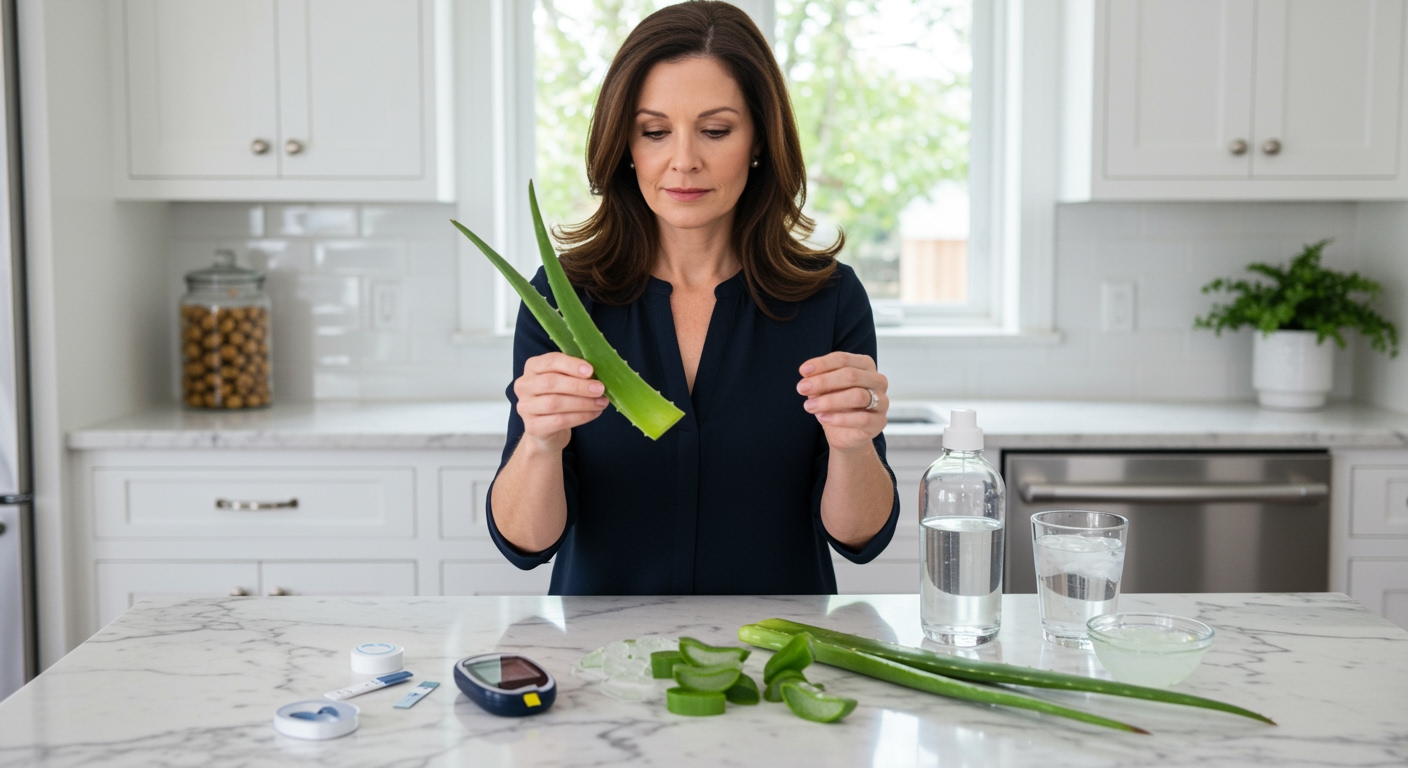✪ Key Takeaway: Aloe vera may lower blood sugar levels, but it can cause dangerous drops and interact with diabetes medications.
Introduction
Your neighbor swears aloe vera cured her diabetes, but your doctor warns against it.
You might be asking this question because you want a natural way to manage your blood sugar without relying only on medications.
Hi, I’m Abdur, your nutrition coach and today I’m going to explain whether aloe is truly beneficial for diabetes and what the science actually shows.
How Does Aloe Vera Affect Blood Sugar Levels?
Aloe vera contains compounds called glucomannan and other polysaccharides that can influence how your body processes glucose.
These compounds work by slowing down the absorption of sugar from your digestive tract into your bloodstream.
Research shows that aloe vera gel can reduce fasting blood glucose levels by up to 46.6 mg/dL in some people with type 2 diabetes.
The plant also contains chromium, which helps your body use insulin more effectively.
However, this blood sugar lowering effect can be unpredictable and varies greatly between different people.
✪ Fact: Aloe vera can reduce blood sugar levels by 20-50% in some studies, but results vary widely between individuals.
What Are The Risks Of Using Aloe For Diabetes?
The biggest danger with aloe vera is hypoglycemia or dangerously low blood sugar levels.
When you combine aloe with diabetes medications like metformin or insulin, your blood sugar can drop to life-threatening levels.
Aloe vera also contains compounds called anthraquinones that can cause severe diarrhea and dehydration.
This dehydration can make your blood sugar levels even more unstable and harder to control.
Some people experience stomach cramps, nausea, and electrolyte imbalances when using aloe vera regularly.
Long-term use of whole leaf aloe products may also damage your kidneys, which is especially concerning for diabetics who already face kidney risks.
✪ Note: Never stop or reduce your diabetes medications without medical supervision, even if aloe vera seems to help.
Which Type Of Aloe Should Diabetics Consider?
Not all aloe vera products are created equal, and this matters greatly for safety and effectiveness.
Aloe vera gel from the inner leaf is generally safer than whole leaf extracts that contain the outer rind.
The outer rind contains high levels of aloin, a compound that causes the harsh laxative effects.
Look for products that specifically state they are decolorized and have removed the aloin content.
Fresh aloe gel directly from the plant may seem natural, but it can contain varying amounts of these problematic compounds.
Commercial aloe juice products often contain added sugars, which completely defeats the purpose for diabetics.
✪ Pro Tip: Always check the ingredient list for added sugars or artificial sweeteners before buying any aloe vera product.
What Does The Research Actually Show?
Several studies have examined aloe vera for diabetes, but the results are mixed and often contradictory.
A 2016 review found that aloe vera reduced fasting blood glucose and HbA1c levels in some studies.
However, most of these studies were small, short-term, and had significant design flaws.
The quality of aloe vera products used in research varies dramatically, making it hard to draw reliable conclusions.
Many studies also failed to account for participants changing their diet or exercise habits during the research period.
The most concerning finding is that researchers could not predict who would benefit and who might experience dangerous side effects.
✪ Fact: Most aloe vera diabetes studies lasted only 4-12 weeks, providing no data on long-term safety or effectiveness.
Should You Try Aloe Vera For Your Diabetes?
The decision to use aloe vera should never be made without consulting your healthcare provider first.
Your doctor needs to know about any supplements you take because they can affect your medication dosages.
If your doctor approves a trial, start with very small amounts and monitor your blood sugar closely.
Keep detailed records of your blood glucose readings, symptoms, and any side effects you experience.
Never use aloe vera as a replacement for proven diabetes treatments like proper diet, exercise, and prescribed medications.
Remember that managing diabetes effectively requires a comprehensive approach, not just adding one supplement.
✪ Pro Tip: Focus on proven strategies like portion control and regular exercise before experimenting with supplements like aloe vera.
The Bottom Line
Aloe vera shows some promise for blood sugar control, but the risks often outweigh the potential benefits for most diabetics.
Your health is too important to gamble with unproven remedies when proven treatments already exist.
I would love to hear about your experiences with natural diabetes management or any questions you have about aloe vera in the comment section below.
References
At NutritionCrown, we use quality and credible sources to ensure our content is accurate and trustworthy. Below are the sources referenced in creating this article:
- PMC: Aloe Vera for Diabetes
- Healthline: Aloe Vera for Diabetes
- Journal of Pharmacy and Pharmacognosy Research: Aloe Vera and Blood Sugar Control
- International Journal of Diabetes and Clinical Research: Diabetes Clinical Research





